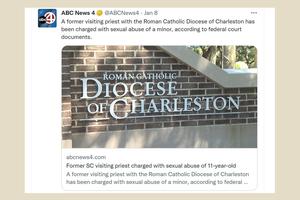Charleston Bishop ‘Conquered Hearts’ Ministering to Hispanics in Georgia
Bishop Fabre-Jeune’s novitiate took place in Guadalajara, Mexico, where he learned to speak Spanish fluently — one of the five languages he speaks today.

ATLANTA, Ga. — The newly consecrated Bishop of Charleston showed a great commitment and love for the Hispanic community in the Archdiocese of Atlanta where he previously served, according to a Hispanic leader in Atlanta.
Bishop Jacques Fabre-Jeune, a Haitian emigrant, became the Charleston diocese’ first Black bishop when he was installed on May 13.
Bishop Fabre-Jeune had previously served as the administrator of the San Felipe de Jesús Mission in Forest Park, Georgia, south of Atlanta, a congregation which he himself described at “99% Mexican.”
Jairo Martinez, who is retired today after 16 years serving as Director of the Atlanta Archdiocese’ Hispanic Ministry Office, told CNA that despite not being a member of the Hispanic community, Bishop Fabre-Jeune endeared himself to the community with his “sense of commitment” as well as his “love for the people.”
Bishop Fabre-Jeune’s commitment to getting a new church building built for the mission, which came to fruition in 2011, “shows really how Father Jacques got to the heart of those Hispanics, because let me tell you, he conquered their hearts," Martinez said.
Bishop Fabre-Jeune, a Haitian native and immigrant New Yorker who was ordained a priest in 1986, arrived at the San Felipe mission in 2008. After graduating college, Bishop Fabre-Jeune had joined the Missionaries of St. Charles Borromeo, also known as the Scalabrinians. The Scalabrinians were originally founded to support the spiritual needs of missionaries going to South and North America, and today its members do much to serve refugees and immigrants.
Bishop Fabre-Jeune’s novitiate took place in Guadalajara, Mexico, where he learned to speak Spanish fluently — one of the five languages he speaks today.
Martinez said finding clergy to minister to Georgia’s large Hispanic population is one of the biggest challenges the Hispanic Catholic community faces in the state. It is difficult, he said, to find men who are not merely bilingual, but also are willing to understand the culture.
Many Hispanic Catholics, though they may be bilingual and speak English in most of their interactions in society, will still prefer to attend Mass and practice their faith in Spanish, he said.
Their formation has often been done in Spanish in their native country, and they pray in Spanish. Even children of Hispanic immigrants who are native English speakers will often prefer to worship with their parents in Spanish, he said.
“So it is important to give them an opportunity to live their spiritual life in their own language,” Martinez noted.
The San Felipe mission itself symbolizes the progress that the Hispanic community has made in Atlanta, Martinez said. When Martinez first saw the mission, it was located in a very poor area, in a run-down building, with tarps over the roof to keep out the rain. Later, in 2002, the archdiocese purchased a former Protestant church to house the Catholic congregation, and eventually under Bishop Fabre-Jeune’s leadership the community built and opened the new church building still in use today.
During his time at the mission, Bishop Fabre-Jeune also served as the director of the Hispanic Charismatic Renewal and a member of the Archdiocese of Atlanta’s finance council. Noting Bishop Fabre-Jeune’s skills as an administrator as well as his love for his flock, Martinez said if someone had asked him a few years ago for recommendations of priests who would make good bishops, he would have suggested Father Fabre-Jeune.
In terms of the broader Hispanic Catholic community in the United States, which is growing rapidly, Martinez said Catholics in the U.S. can learn from the “simplicity” of the faith of Hispanic Catholics. Martinez also said he greatly admires the strong sense of local community and family that is present in Hispanic culture. He says he has seen the Archdiocese of Atlanta make a “huge effort” to serve the Hispanic community, and he hopes other dioceses and archdioceses will do the same.
- Keywords:
- diocese of charleston


















